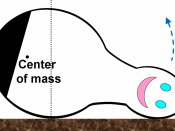Bandura's "Bobo Doll" experiments demonstrated a link between violent media programs and aggressive behavior. It is very interesting, but not surprising to note that children imitated an adult's behavior that beat up on a doll. I agree that what children see in television or in other mediums can have an effect on how they behave. However, I feel that there are many factors that come in to play. These could include personality, background, intensity of the act, and surroundings. For some children, under some conditions, television can be harmful. For most children, under most conditions, television is probably neither harmful nor beneficial.
It seems like the idea of a child beating up the same doll does not really have anything to do with reality. In reality, a child might watch a cartoon character slap another cartoon character. According to Bandura's experiment, the child would slap the cartoon character later if faced with him, but that is impossible! Perhaps one would argue that it does not have to be the same character that they re-create fights with, such as re-creating a fight on a younger sibling.
I think in cases such as these, it is possibly unavoidable for the child to be curious about what would happen if they were violent to their sibling. Eventually, the child will discover that this sort of behavior is unacceptable and punishable. If not, the child probably has a type of social disorder, which not every child has.
The point is, while every child might go though a few moments of violence in experimentation, if there are no factors that feed this curiosity (such as violence from the family or social disorders) the behavior will stop, regardless of what the child has seen on television.
As for violent media content being cathartic, I...


